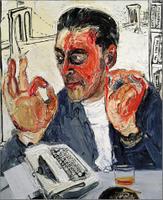
I set up the funeral by telephone, contacted a few of [Uncle] Victor's friends (Howie Dunn, the broken-nosed saxophonist, a number of former students), made a half-hearted attempt to reach Dora (she couldn't be found), and then accompanied the casket back to Chicago. Victor was buried next to my mother, and the sky pelted us with rain as we stood there watching our friend disappear into the earth. Afterward, we drove to the Dunns' house on the North Side, where Mrs. Dunn had prepared a modest spread of cold cuts and hot soup. I had been weeping steadily for the past four hours, and in the house I quickly downed five or six double bourbons along with my food. It brightened my spirits considerably, and after an hour or so I began singing songs in a loud voice. Howie accompanied me on the piano, and for a while the gathering became quite raucous. Then I threw up on the floor, and the spell was broken. At six o'clock, I said my good-byes and lurched out into the rain. I wandered blindly for two or three hours, threw up again on a doorstep, and then found a thin, gray-eyed prostitute named Agnes standing under an umbrella on a neon-lit street. I accompanied her to a room in the Eldorado Hotel, gave her a brief lecture on the poems of Sir Walter Raleigh, and then sang lullabies to her as she took off her clothes and spread her legs. She called me a lunatic, but then I gave her a hundred dollars, and she agreed to spend the night with me. I slept badly, however, and at four a.m. I slipped out of bed, climbed into my wet clothes, and took a taxi to the airport. I was back in New York by ten o'clock.
Paul Auster, Moon Palace
This passage sits on page 18 of my copy of Paul Auster's incomparable Moon Palace. The preceeding 17 pages pulled me along without effort, but when I encountered this paragraph, it was the equivalent of hearing your lover sing, and realizing just how totally you have fallen for her.
I was nursing a broken heart at the time, and thought this paragraph was as sweet an ode to my condition as Patsy Cline's Crazy. The narrator, Marco Fogg, was informed of his Uncle Victor's death two paragraphs earlier. In the first sentence we get an immediate portrait of what a loser Victor was - gifted saxophonists use the entire oral cavity to influence the tone of their instrument, but Victor's bandmate, Howie, is a "broken-nosed saxophonist"; note also the "former students"; Victor's sometime lover, Dora, can't be found; and by second sentence his remains are consigned to lie next to his sister, in a scene accompanied by the pathetic fallacy of pelting rain.
Marco's broken heart plays itself out in devastating understatement. He is in rough shape at the beginning of the scene, and his state of mind further deteriorates with breathtaking speed. His intake of bourbon is ill-advised, if understandable, as is his employment of the prostitute. Between the alcohol and the woman, he flails about, trying to find his emotional footing. There is none to be had, a terrible reality punctuated by the cold factual reportage of the last sentence.
This is page 18. Marco, like so many young men his age, is adrift and this tiny episode of heartbreak launches him on a dizzying journey of loss, discovery, and recovery - an emotional circuit that is as dependable as the lunar cycle. As the novel progresses we get a nuanced picture of how our personal mythologies are forged by historical forces, and tempered by the people we love. We also get intimations of just how deeply our family history influences our actions, whether we are aware of it or not.
This is an incredible novel. I discovered it in 1992, while I was hammering out my own bildungsroman, which I'd set in the 60s. Since my chosen setting occurred some ten-plus years before I had much by way of awareness, I devoured anything written in, about, during the 60s. This novel, like Leviathan after it, encapsulates both the crazy promise and the emotional ruin of that era (certainly much, much better than anything Tom Wolfe ever did with his "New" "Journalism"). It also articulates with clarity and compassion the realizations that every young man has to reach if maturity is to be grasped.
I return to Moon Palace today, after reading this link ("the enjambment of fiction and reality") from Maud Newton. Auster has said that writing is the only thing he can do, that if he could not make a living from it, chances are he wouldn't be alive. It's difficult to ascertain just how much truth these "all or nothing" statements contain, but when read alongside the news of his domestic travails, it invokes no small sadness for the personal toll his literary fame (along with other factors, no doubt) has taken. The words of the critic - "Endurance, survival, reinvention; the trajectory that one does not give up, follows loss, attends to the grieving process" - sound just about right.
Great piece here, WP. On your recommendation some months ago, I picked up a copy of "Moon Palace". I may have to ditch my current set of books and dive into this one, like a bum into a dumpster, thanks to your passionate bit of (re)recommending. Thanks.
ReplyDeleteThanks, Darko. I'll be curious to hear what you think. Don't worry about being polite, if you don't like it!
ReplyDelete